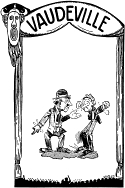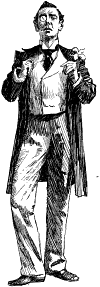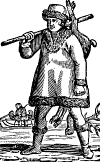Search us!
Search The Word Detective and our family of websites:
This is the easiest way to find a column on a particular word or phrase.
To search for a specific phrase, put it between quotation marks. (note: JavaScript must be turned on in your browser to view results.)
Ask a Question! Puzzled by Posh?
Confounded by Cattycorner?
Baffled by Balderdash?
Flummoxed by Flabbergast?
Perplexed by Pandemonium?
Nonplussed by... Nonplussed?
Annoyed by Alliteration?

Don't be shy!
Send in your question!
Columns from 1995 to 2006 are slowly being added to the above archives. For the moment, they can best be found by using the Search box at the top of this column.
 If you would like to be notified when each monthly update is posted here, sign up for our free email notification list.
If you would like to be notified when each monthly update is posted here, sign up for our free email notification list.
Trivia
All contents herein (except the illustrations, which are in the public domain) are Copyright © 1995-2020 Evan Morris & Kathy Wollard. Reproduction without written permission is prohibited, with the exception that teachers in public schools may duplicate and distribute the material here for classroom use.
Any typos found are yours to keep.
And remember, kids,
Semper Ubi Sub Ubi
|
Over here?
Dear Word Detective: Some time ago I was reading My Man Jeeves by P.G. Wodehouse, a treasure trove of obscure and quaint idioms and slang terms as I’m sure you know. In the chapter “The Unbidden Guest,” Bertie describes an unannounced visitor as “measuring about 6 feet from the O.P. to the prompt side.” While it’s clear from the rest of the paragraph that she is, shall we say, a full-figured woman, what precisely are the “O.P.” and “the prompt side”? — Andrew Buckland.
Thanks for a great question. The stories of P.G. Wodehouse are indeed a rich source of obscure and nearly obsolete words and expressions, as well as being enormous fun to read in their own right. I was reluctant for many years to venture into the world of, as I thought at the time, “some rich twit and his butler.” But after a friend convinced me to take the plunge, I didn’t come up for air until I had read a hefty chunk of what Wodehouse wrote (and we’re talking about a man who wrote more than ninety books). I left off reading Wodehouse about fifteen years ago, but it may be time to start again. There certainly isn’t anything on TV.
 Not to make my job sound easier than it is, but something quite serendipitous happened when I began to research this question. I already had a strong hunch about what Wodehouse meant by “from the O.P. to the prompt side,” but on a whim I plugged the whole phrase into the full-text search engine of the Oxford English Dictionary. Lo and behold, there was the same quotation from My Man Jeeves listed as a citation for the abbreviation “O.P.” That, kiddies, is what we call “on a silver platter.” Not to make my job sound easier than it is, but something quite serendipitous happened when I began to research this question. I already had a strong hunch about what Wodehouse meant by “from the O.P. to the prompt side,” but on a whim I plugged the whole phrase into the full-text search engine of the Oxford English Dictionary. Lo and behold, there was the same quotation from My Man Jeeves listed as a citation for the abbreviation “O.P.” That, kiddies, is what we call “on a silver platter.”
Both “prompt side” and the abbreviation “O.P.” come from the theatrical stage. Especially in amateur productions, even the best actors are apt to forget a line occasionally, and the task of rescuing the moment by “prompting,” giving visual or audible clues, falls to the “prompter” (or sometimes the stage manager) standing offstage in the wings. Traditionally, the prompting is done from the left side of the stage (as one faces the audience), also known as “stage left.” The abbreviation “O.P.” stands for “opposite prompt,” meaning the other side of the stage, i.e., “stage right.” Both terms date back at least to the 18th century.
Thus, when Wodehouse described his character, Lady Malvern, as “measuring about six feet from the O.P. to the Prompt Side,” he was leavening an otherwise bland exaggeration with the sort of clever turn of phrase that makes his stories so addictive.
Oh, please.
Dear Word Detective: From where does the phrase “pish posh” come? — Michelle.
Hey, that’s a good question. As an aficionado of dismissive phrases (“High voltage? Fiddlesticks!”), I’m always up for an investigation of the wonderful world of casting contemptuous scorn on the solemn pronouncements of other people.
Speaking of such things, there’s an old chestnut, almost certainly apocryphal, about a linguistics professor lecturing his class on negation in English grammar. “In English,” he says, “a double negative forms a positive. However, in some languages, a double negative remains a negative. But there isn’t a single language, not one, in which a double positive can express a negative.” Whereupon a voice from the back of the room pipes up, “Yeah, right.”
There are a few problems with that tale, including the fact that several popular dialects of English do indeed use “double negatives” (e.g., “ain’t nobody home”) to express a negative statement, and that “Yeah, right” in that context is sarcasm, not a double positive, but, aside from that, it’s a cute story.
 Meanwhile, back at “pish posh,” I’ve been accustomed to using the form “pish tosh,” but “pish posh” actually wins the Google poll with 143,000 hits versus a mere 24,800 for “pish tosh.” Both phrases, of course, do the job of meaning something between “Don’t be a silly goose” and “Gimme a break, dude.” The advantage of “pish posh” is its air of gentleness and refinement, which means that you are less likely to earn yourself a bop in the nose with it than by snorting “Hogwash!” Meanwhile, back at “pish posh,” I’ve been accustomed to using the form “pish tosh,” but “pish posh” actually wins the Google poll with 143,000 hits versus a mere 24,800 for “pish tosh.” Both phrases, of course, do the job of meaning something between “Don’t be a silly goose” and “Gimme a break, dude.” The advantage of “pish posh” is its air of gentleness and refinement, which means that you are less likely to earn yourself a bop in the nose with it than by snorting “Hogwash!”
“Pish posh” actually appears to have two sources. “Pish” by itself has been used as an interjection of impatience or contempt since the 16th century, and, like “pshaw” and “pah,” it arose as an imitation of the sound of disgusted surprise (“‘Pish!’ I growled. ‘Someone has fooled you,'” 1894).
The “posh” part of “pish posh” is what linguists call “reduplication,” the repetition of a word with slight variation as a means of emphasis or elaboration (as in “hoity-toity”). It has no connection to “posh” in the sense of “fancy” (which comes from the Romany language of Gypsies).
But there is another sort of “pish posh,” a variant of “pish pash,” which is a stew made of rice and small bits of meat, usually chicken, popular in India. “Pash” is an old English dialect word for “smash,” here apparently referring to the small pieces of meat. “Pash posh” (or “pish posh”) is apparently an 18th century Anglo-Indian invention, born of the long British colonial occupation of the country, and the term is said to have originally been “baby talk” used with children at mealtimes.
It seems plausible that the popularity of the impatient interjection “pish” among people familiar with the dish “pish posh” would have led naturally to the elaboration of “pish” with “posh,” giving us the ever-useful “pish posh!”
And we don’t need a library. We’ve got satellite TV.
Dear Word Detective: I have heard the term “jerkwater town” and never thought much about it. I inferred from the context that it was a small place that didn’t amount to much. I recently encountered this in a book and began to wonder what its origin is. Do you know? — Jo Ann Chase.
 Yes, I am intimately familiar with the phrase “jerkwater town.” The town nearest to us here in rural Ohio, East Bump, neatly matches the description given in the Journal of Genetic Psychology in 1936: “It was one of those jerkwater towns that have one lawyer, one drug store and no traffic cops.” The only differences are that East Bump has no lawyer that I know of, and it does employ a police officer to guard against incursions from West Bump, although he only works part-time. It also boasts a Post Office, two really awful restaurants and a seedy bar sporting, for some bizarre reason, a pirate motif. Aaarrgh, Matey. Yes, I am intimately familiar with the phrase “jerkwater town.” The town nearest to us here in rural Ohio, East Bump, neatly matches the description given in the Journal of Genetic Psychology in 1936: “It was one of those jerkwater towns that have one lawyer, one drug store and no traffic cops.” The only differences are that East Bump has no lawyer that I know of, and it does employ a police officer to guard against incursions from West Bump, although he only works part-time. It also boasts a Post Office, two really awful restaurants and a seedy bar sporting, for some bizarre reason, a pirate motif. Aaarrgh, Matey.
In any case, you inferred correctly about the connotation of “jerkwater.” Something that is “jerkwater” is considered small, inferior and insignificant, with overtones of provincialism and hickdom. Although most commonly applied to small, isolated (and thus presumably uncultured) towns, “jerkwater” can also describe anything considered unsophisticated, a “dead end” or “not up to snuff,” from schools (“It won’t be easy for him to get another job if he’s fired … Maybe at some jerkwater college at half what he’s getting now,” 1970) to vaudeville acts (“Vaudeville teams — from the jerkwater acts to specialists,” 1950).
The original logic behind “jerkwater” has long been gone from towns like East Bump, which is a shame. In the early days of railroads, when the locomotives were steam-powered, the boiler’s supply of water needed to be refilled fairly often. Large towns and cities had water towers by the tracks, and topping off the tank was simply a matter of pulling under the spigot and hooking up. In smaller rural towns, however, such amenities were lacking, and a train crew in need of water faced the chore of fetching it by hand from a nearby stream. As one account explained in 1945, “… train crews, when the water got low, often had to stop by a creek, form a bucket brigade and jerk water from the stream to fill the tender tank.” “Jerk” in this context refers to the rough, sudden movement of lifting a bucket, often on a rope, from the creek.
In the late 19th century, trains that ran on branch lines through rural districts where such a ritual was routine became known as “jerkwater trains,” and the routes as “jerkwater lines.” Almost immediately, “jerkwater” came to be a slang synonym for an isolated rural town served by such a line, and by 1897 “jerkwater” had taken on its modern meaning of “provincial, backward and insignificant.”
|
Makes a great gift! Click cover for more.  
400+ pages of science questions answered and explained for kids -- and adults!
FROM ALTOIDS TO ZIMA, by Evan Morris
 
|
 Not to make my job sound easier than it is, but something quite serendipitous happened when I began to research this question. I already had a strong hunch about what Wodehouse meant by “from the O.P. to the prompt side,” but on a whim I plugged the whole phrase into the full-text search engine of the Oxford English Dictionary. Lo and behold, there was the same quotation from My Man Jeeves listed as a citation for the abbreviation “O.P.” That, kiddies, is what we call “on a silver platter.”
Not to make my job sound easier than it is, but something quite serendipitous happened when I began to research this question. I already had a strong hunch about what Wodehouse meant by “from the O.P. to the prompt side,” but on a whim I plugged the whole phrase into the full-text search engine of the Oxford English Dictionary. Lo and behold, there was the same quotation from My Man Jeeves listed as a citation for the abbreviation “O.P.” That, kiddies, is what we call “on a silver platter.”

 can be found
can be found 

 Yes, I am intimately familiar with the phrase “jerkwater town.” The town nearest to us here in rural Ohio, East Bump, neatly matches the description given in the Journal of Genetic Psychology in 1936: “It was one of those jerkwater towns that have one lawyer, one drug store and no traffic cops.” The only differences are that East Bump has no lawyer that I know of, and it does employ a police officer to guard against incursions from West Bump, although he only works part-time. It also boasts a Post Office, two really awful restaurants and a seedy bar sporting, for some bizarre reason, a pirate motif. Aaarrgh, Matey.
Yes, I am intimately familiar with the phrase “jerkwater town.” The town nearest to us here in rural Ohio, East Bump, neatly matches the description given in the Journal of Genetic Psychology in 1936: “It was one of those jerkwater towns that have one lawyer, one drug store and no traffic cops.” The only differences are that East Bump has no lawyer that I know of, and it does employ a police officer to guard against incursions from West Bump, although he only works part-time. It also boasts a Post Office, two really awful restaurants and a seedy bar sporting, for some bizarre reason, a pirate motif. Aaarrgh, Matey.



Recent Comments